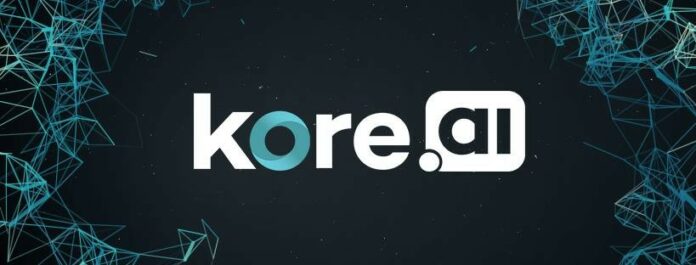Amid a wave of layoffs in the tech industry, it's encouraging to see some startups succeeding despite the bleak market outlook.
kore.ai, a company developing enterprise-focused conversational AI and GenAI products, raised $150 million in a funding round led by FTV Capital, Nvidia, Vistara Growth, Sweetwater PE, NextEquity, Nicola and Beedie. Bringing the company's total raised to ~$223 million, the new cash will go toward product development and expanding Kore.ai's workforce, said co-founder and CEO Raj Koneru.
Koneru founded Kore.ai in 2014 after launching Kony, a mobile app development startup, and several other small businesses, including iTouchPoint (an outsourcing company) and Intelligroup (a technology consultancy). He says he was inspired to found Kore.ai after seeing the potential of AI, particularly OpenAI's ChatGPT-like large language models (LLMs), to transform user experiences.
“With the introduction of GenAI and LLM, the technology landscape turned out to be very chaotic and uncertain due to rapid advancements,” Koneru said. “There were more questions than answers… but I saw conversational AI and LLMs as an opportunity to innovate.”
As GenAI is a new discipline, Kore.ai was not developing GenAI products in 2014 per se. But Koneru says the company was laying the groundwork for future GenAI products: investing heavily in text generation and analysis models.
So how is it kore.ai innovating? Well, as Koneru describes it, the startup provides a no-code platform to help businesses power various “business interactions” through AI – essentially any customer-to-employee or employee-to-employee interaction via phone or text message ( think support chats). with an IT/HR support service. Kore.ai offers workflows and tools designed to give businesses in industries such as banking, healthcare, and retail the ability to build custom conversational AI applications or deploy pre-built, “domain-trained” chatbots.
“Kore.ai’s platform encompasses intelligent virtual agent, AI contact center, AI agent, and search and response capabilities for all types of customer experience and employee experience use cases,” Koneru said. “In addition, Kore.ai’s range of industrial and horizontal solutions addresses the needs of specific industries and business functions.”
But aren't there many vendors creating GenAI and LLM-powered solutions for search, question answering, and other types of applications that Kore.ai advertises they support? In fact, there are.
For example, the company Acree, which hosts a platform for creating GenAI corporate applications, and Giga ML, which offers tools to help companies implement LLM offline. Reka and Contextual AI recently emerged from the underground to help create custom AI models for organizations, while Fixie is creating tools to make it easier for companies to code on top of LLMs.
What Kore.ai does differently, Koneru says, is offer great flexibility when it comes to where companies can deploy their AI applications (in the cloud, on-premises, or in virtual machines) and the degree to which they can fine-tune these applications. . For certain applications (e.g., text summarization, search and answer generation, topic discovery, and sentiment analysis), Koneru advocates that fine-tuned models (Kore.ai's specialty) are superior to the larger, more powerful models available. from providers like Anthropic and OpenAI, as well as more cost-effective.
There's also a privacy argument for smaller offline models.
Una poll from Predibase in 2023 found that more than 75% of companies do not plan to use cloud-hosted commercial LLMs in production for fear that the models will compromise sensitive information. In a online survey Separately from GenAI platform Portal26 and data research firm CensusWide, 85% of companies said they are concerned about the privacy and security risks of GenAI.

Creating a GenAI or Conversational AI workflow using Kore.ai web tools.
“Over the past 18 months, we have observed that fine-tuned models are very effective compared to pre-trained models for specific business use cases,” Koneru said. “Compared to a large pre-trained model, it takes less than 2% of enterprise data to train and create a fine-tuned model that enterprises can safely deploy for enterprise use cases. “We have successfully created LLMs for smaller businesses that provide greater efficiency, greater accuracy, the ability to control responses and, most importantly, reduce latency and costs.”
Additionally, unlike some rivals, Kore.ai offers ways for organizations to scale their AI as needed, Koneru says, and expand their use of AI to new and diverse domains.
“Kore.ai sits on top of the infrastructure and fragmentation of all layers of LLM with a platform-based approach, offering freedom of choice with built-in guardrails for effective AI deployment,” Koneru added.
Now, to what extent these capabilities are really spreads is subject to debate. Providers like Google Cloud, Azure, and AWS offer robust scaling solutions for conversational AI and GenAI applications, and Kore.ai isn't the only platform that allows customers to deploy models across a variety of on-premises and cloud computing environments.
But whether thanks to the strength of its platform, its nearly 1000-person workforce, its marketing campaign, or all three, Orlando, Florida-based Kore.ai has established an impressive position in the competitive field of the AI. The company's customer base surpassed 400 brands (including PNC, AT&T, Cigna, Coca-Cola, Airbus and Roche) last year, and its annual recurring revenue now exceeds $100 million, thanks to licensing revenue and usage fees, in addition to consulting.
It probably helps that funding for GenAI startups of all types remains strong. According to a recent poll From GlobalData, the London-based data analytics and consulting firm, GenAI startups raised a record $10 billion in 2023, a 110% increase compared to 2021.
The question is whether the growth is sustainable, given that GenAI is not a success in the company, at least not yet. Koneru maintains that it is, pointing out polls like Gartner's last October, which found that 55% of organizations are already testing or deploying GenAI technology in production for functions such as customer service, marketing and sales.
“We have not seen any slowdown in the market,” Koneru said. “The most pressing challenge we face is operating and innovating in a market that has not only experienced rapid growth but also disruption driven by advances in technology, changing user expectations, and broader integration of new capabilities.” of AI that evolve every day. “Business actors must leverage the benefits of technology while avoiding security, privacy and compliance issues.”
Kapil Venkatachalam of FTV Capital added in a statement: “While the advanced AI market has seen rapid growth in recent years, many companies are grappling with how to implement AI responsibly and effectively in their organizations. We were impressed with Kore.ai's open platform approach to leveraging AI models, scalability, out-of-the-box vertical-specific applications, and low-code and no-code capabilities, positioning them well to take advantage of growing global demand. . brands seeking innovative AI solutions to improve business interactions and drive value.”




